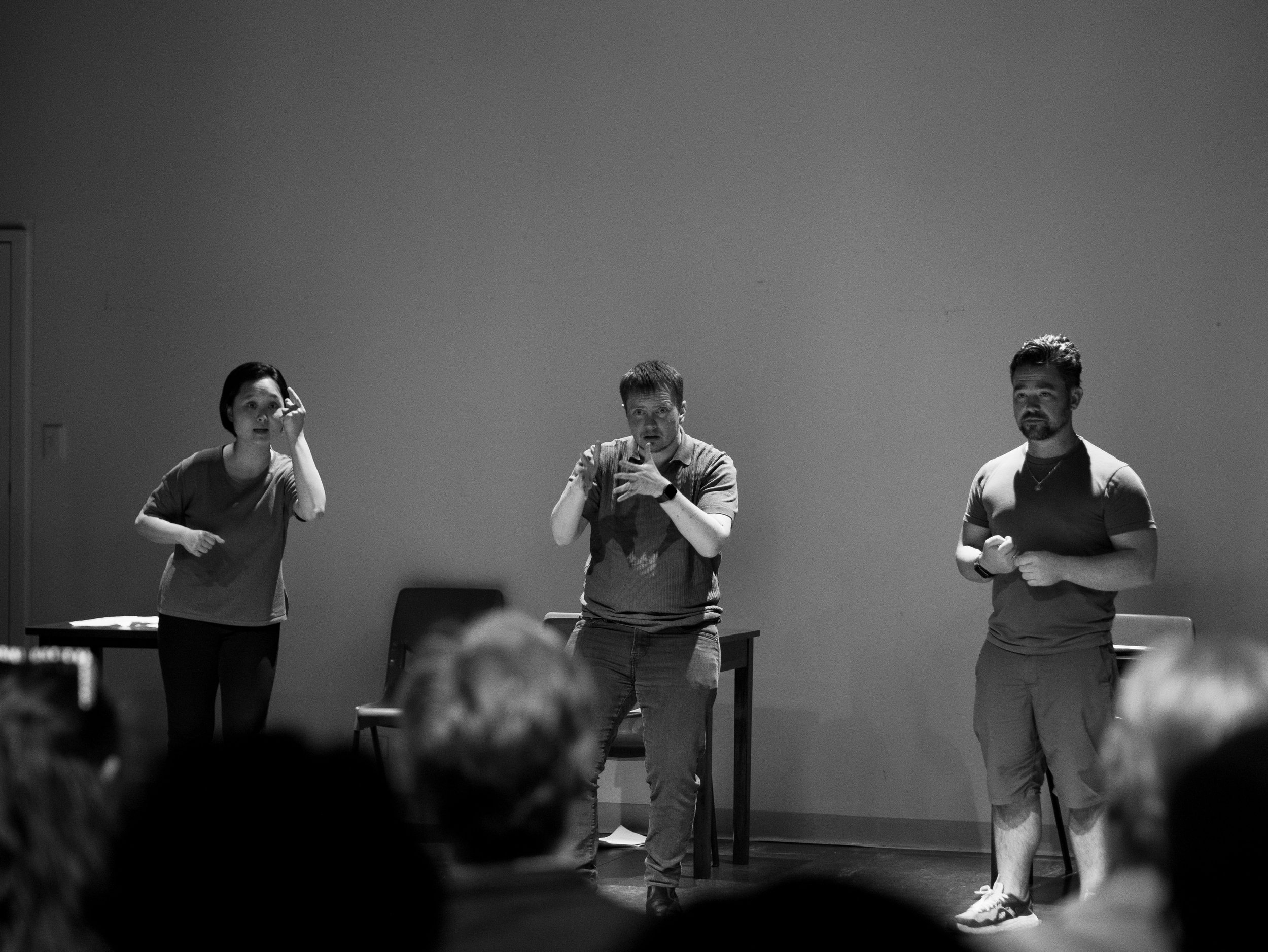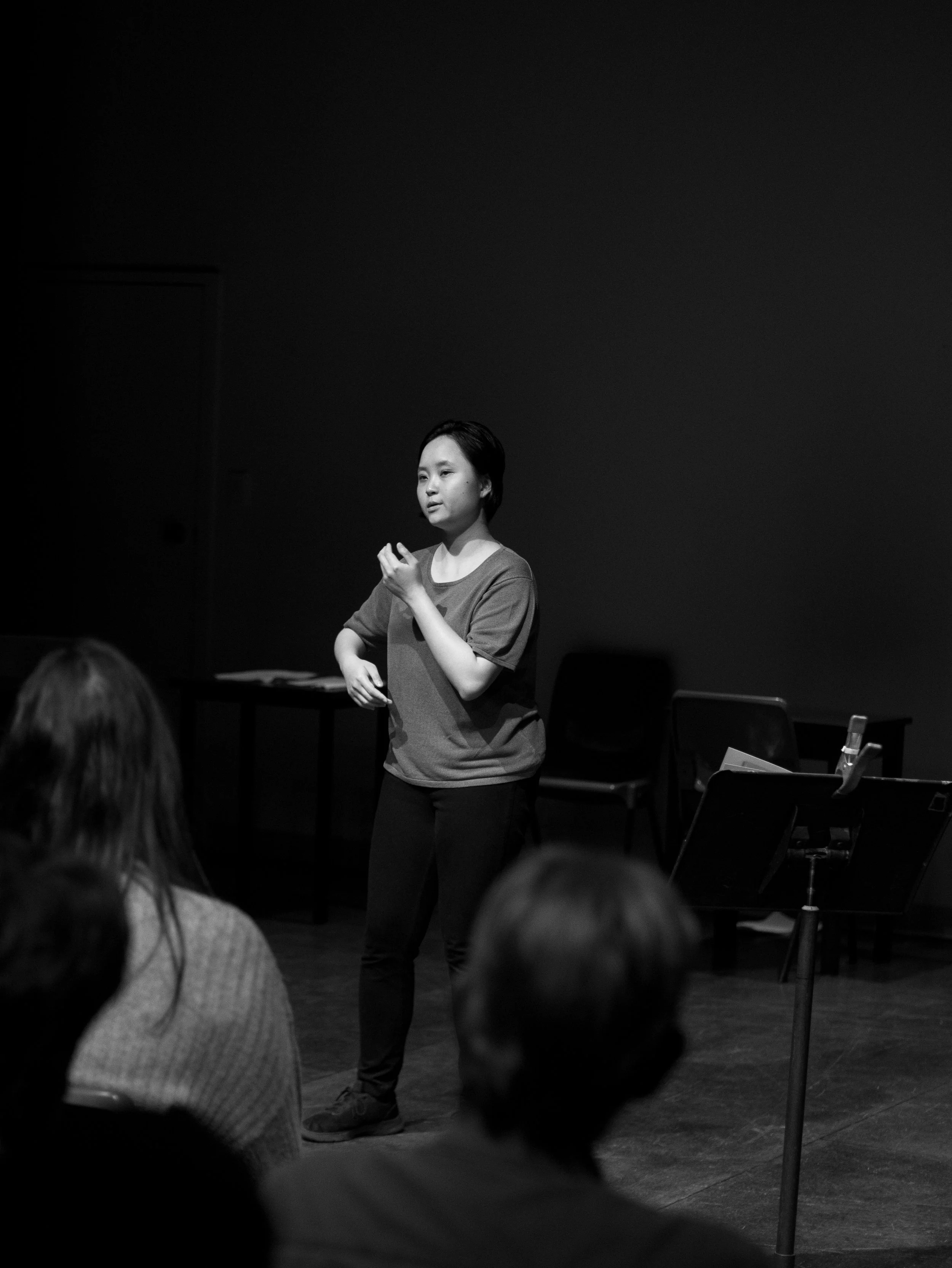The Milan Conference Documentation
The Milan Conference
THE MILAN CONFERENCE is a new theatre work made by re:group and an ensemble of d/Deaf and Hard of Hearing performers. Performed entirely in Auslan, it uses a mix of interpreting, voicing, creative captioning, visual vernacular and video design to discover a unique theatrical language.
Through this, we tell the story of the closure of a Deaf program and the children, teachers and parents fighting for what’s next. By reflecting on the original Milan conference and creating a contemporary parallel—our group of Deaf and hearing artists reckon with what education looks like, when people won’t listen.
-
In 1880, the writing was on the wall for sign language. At The Second International Congress on the Education of the Deaf, the delegation was stacked with proponents of ‘Oralism’—teachers focused on lipreading and articulation and opposed to the use of sign language. In this biased environment, a brave few railed against the foregone conclusion of the conference, arguing to save a language at risk of erasure.
In 2051, the full recommendations of the Australian governments’ Disability Royal Commission are due to be implemented. To the outrage of many in the Deaf community, the report advocates for the complete closure of special schools, essential places where Auslan thrives and survives.
The Deaf community has so far gone unheard.
Once again sign language is under threat.
Why can’t hearing people listen?Our reasons for making this work have changed throughout the process of community consultation and collaboration. We started with a simple idea. Through our interest in prioritising accessibility in our works, we became friends with Jenn Maclaughan and Will Tapp—who have interpreted six of our shows to date. However, we began thinking about the problem of accessibility services only being offered on one night of a season. In this way, however well intentioned, services are a little ‘tacked on’ to the show. We wondered if there was a way of centering the act of interpretation and accessibility within the dramaturgy of the work. How could we make a show that used Auslan as its central language?
In early 2025 we started a process of community consultation that set out to answer that question. Through Jenn and Will, we met with d/Deaf and HOH performers and educators, asking how we might make a work together. These conversations were broad ranging, touching on access needs, aesthetics, the politics of being “Deaf lead”, interpretation, tokenism, lateral violence within Deaf culture and shared creative process. The conversations were challenging and exciting in equal measure, expanding our understanding of what we had set out to make. We found collaborators in Dion Galea, Lauren Toni, Tony Nicholas and Felicity Tchorlian. Early on Felicity told us – “if you’re comfortable, if the audience is comfortable, then it’s not a Deaf work”. We took this to heart.
In light of this, the hearing members of the team have begun learning Auslan. This commitment to the language we’re seeking to represent is a vital part of the process, and a key reason our recent development was able to be as productive as it was. Through this short period, we moved closer to our WHY. We want to talk about the Milan Conference itself, to inform people about a moment in history that profoundly impacted d/Deaf people. But we also want to reflect Deafness in Australia now, and stage key issues in the community, both from the external threats of language deprivation and the Disability Royal Commission, but also hierarchical attitudes within community regarding oral vs signing. Members of the ensemble track this split back to the rupture caused by Milan. For us, bringing this complex history to light is the reason to make the project.
From the perspective of re:group, the story of Milan is also the story of how a group of hearing people, believing they were acting in the best interests of Deaf people, perpetrated a horrendous misjudgement. How could they fail to recognise that the consensus reached at the conference was false, as it excluded the very people for whom they claimed to be acting?
In this way, THE MILAN CONFERENCE is also a story about hearing people. About audism, and the way in which it is taught, learnt and perpetuated by hearing people. It’s a story about the systems that privilege one culture over another one, and about the ways in which personal actions prop up these systems. If this project is to truly grapple with the event in both content and form, we must be incredibly vigilant not to repeat the same violence, exclusion and ‘speaking for’ that The Milan Conference represents to the d/Deaf community. Through consultation, collaboration and play, the combined team will move through a process that honours the complexity of the story, without blundering into its traps.
-
The work is being made collaboratively between re:group and members of the d/Deaf and hard of hearing community, as well as Auslan Interpreters
The cast and creative team is currently comprised of Demon Derriere, Dion Galea, Bedelia Lowrencev, Jeremy Lowrencev, Jen Maclaughlin, Ana Maria Belo, Tony Nicholas, Mark Rogers, Josh Sealy, Will Tapp, Lauren Toni, Solomon Thomas, Steve Wilson-Alexander, Malcolm Whittaker, Carly Young.
-
Our process for the making of THE MILAN CONFERENCE commenced in early 2025 with roundtable discussions with community members to reflect upon the on-going resonance of the original MIlan Conference in Australia and to map out the best practice for working together on the project.
We then commenced a first stage of formal development ‘on the floor’ together at The Rex Cramphorn Studio at University of Sydney across the month of September 2025, with the confirmed funding support of Create NSW and City of Sydney. This culminated in a short showing of several performative strategies we devised through the development, for the feedback of invited guests.
Documentation of this initial research and community engagement process will be added to this webpage as it continues to unfold.
Creative development continues in 2026 with a residency at Bundanon Trust in April.


















